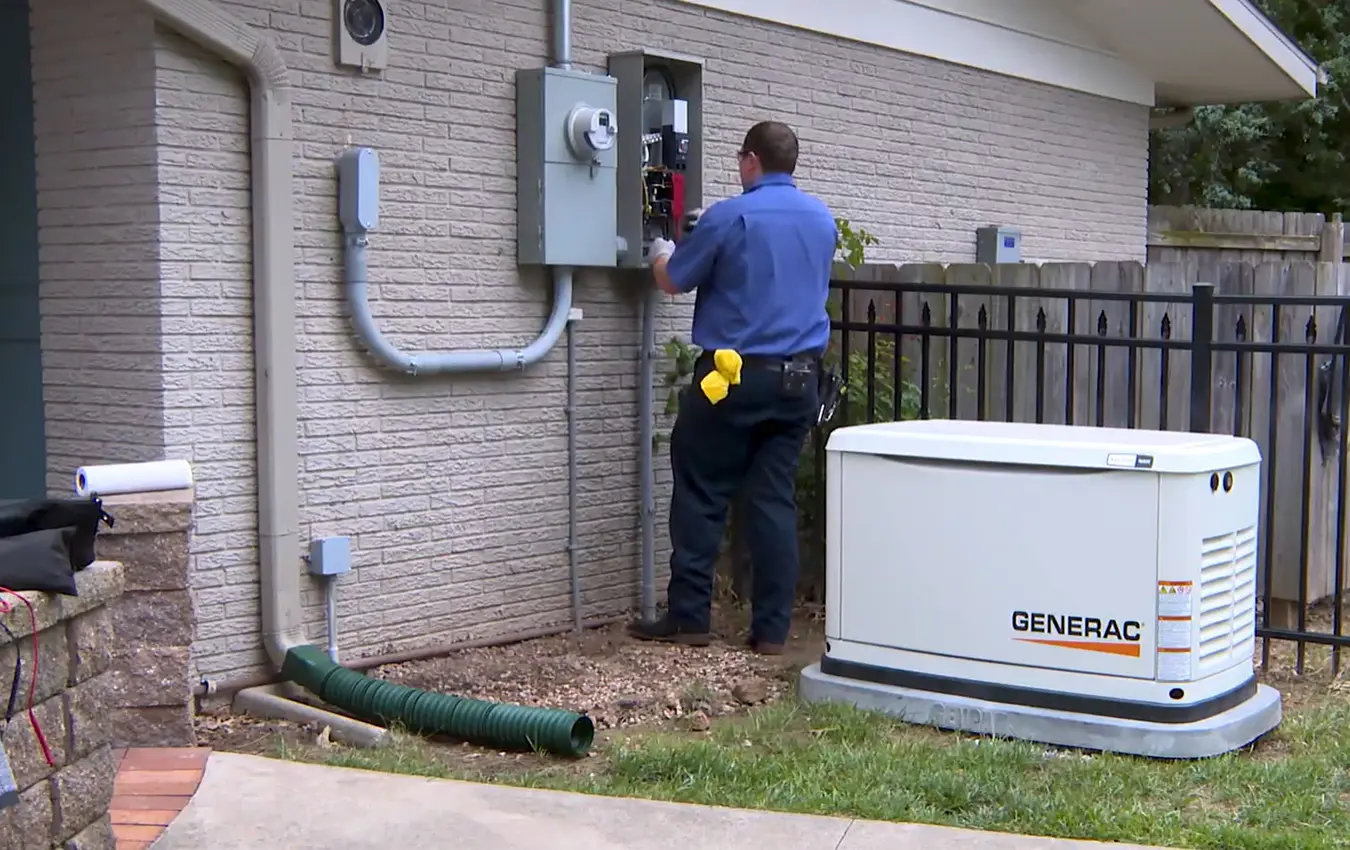Are you tired of unexpected power outages disrupting your daily routine? Imagine a world where you never have to worry about being left in the dark or having your appliances suddenly shut off. With the power of home generators, this dream can become a reality. Home generators are the ultimate solution to keeping your household running smoothly, even during the most severe storms or grid failures. Whether you want to ensure the safety and comfort of your family or maintain the productivity of your home office, a home generator is the answer. In this article, we will explore the various benefits and features of home generators, helping you understand why they are an essential investment for any homeowner. Get ready to power up and take control of your energy supply with the reliability and convenience of a home generator. Say goodbye to power interruptions and hello to uninterrupted peace of mind.
The Importance of Having a Home Generator
When it comes to power outages, they can happen at any time, often when you least expect it. Whether it’s due to severe weather conditions, equipment failures, or grid failures, losing electricity can be a major inconvenience and even a safety hazard. Having a home generator is crucial to ensuring that you and your family are always protected and comfortable, no matter the circumstances.
A home generator acts as a backup power source that automatically kicks in when there is a disruption in your main power supply. It provides you with a seamless transition, ensuring that your essential appliances, such as refrigerators, heating or cooling systems, and medical equipment, continue to function without any interruptions. Additionally, having a home generator can also save you from potential damage caused by power surges when the electricity comes back on. It acts as a reliable insurance policy, giving you peace of mind during uncertain times.
Investing in a home generator is not just about convenience or safety; it also adds value to your property. A home equipped with a generator becomes more attractive to potential buyers as it offers an added layer of security and comfort. So, not only does a home generator provide immediate benefits, but it can also be seen as a long-term investment.
You have not yet decided on the type of backup generator and its capacity?
You can get advice from Premier Electrical Services on which backup generator you require for your house. Requesting a risk-free quotation is the easiest method to determine what size standby generator you require. Call us, 954-900-1696 for additional information or to get a free consultation.
Types of Home Generators – Portable vs. Standby
When it comes to home generators, there are two main types to consider: portable generators and standby generators. Each type has its own set of advantages and considerations, so it’s essential to understand the differences before deciding.
Portable Generators
Portable generators are versatile and can be easily moved around to provide power wherever it’s needed. They are typically fueled by gasoline or propane and come in various sizes, allowing you to choose the right capacity for your needs. Portable generators are a popular choice for homeowners who want flexibility and affordability. They are ideal for powering essential appliances and electronics during short power outages or outdoor activities like camping or tailgating. However, it’s important to note that portable generators require manual setup and supervision, and they have limited capacity compared to standby generators.
Standby Generators
Standby generators, also known as whole-house generators, are permanently installed outside your home and are directly connected to your electrical system. They are powered by natural gas or propane and can automatically turn on within seconds of a power outage. Standby generators offer a seamless and uninterrupted power supply to your entire home, including all the appliances and systems you rely on daily. They are designed to provide long-term backup power and can run for extended periods without the need for refueling. Standby generators are the ultimate solution for homeowners who prioritize convenience, reliability, and the ability to power their entire home during an outage.
When choosing between portable and standby generators, it’s crucial to consider factors such as your budget, power requirements, and the duration of potential power outages. Both types have their benefits, so it’s essential to assess your specific needs and preferences before deciding.
Factors to Consider When Choosing a Home Generator
Choosing the right home generator involves careful consideration of several key factors. By understanding and evaluating these factors, you can ensure that you select a generator that meets your specific requirements and provides reliable performance when you need it most.
Power Capacity
One of the most crucial aspects to consider when selecting a home generator is its power capacity. You need to determine the amount of power you’ll need to run your essential appliances and systems during a power outage. Consider the wattage requirements of your appliances and add them up to determine the total power capacity you’ll need from a generator. It’s essential to select a generator with sufficient wattage to handle the startup power requirements of your appliances, as some devices may require more power when initially turned on.
Fuel Type
Another important consideration is the fuel type of the generator. Common options include gasoline, propane, and natural gas. Each fuel type has its own pros and cons, such as availability, cost, and storage requirements. Gasoline is widely available but may require frequent refueling, especially during extended power outages. Propane offers a longer shelf life and is readily available in portable tanks, but it may require additional equipment for storage. Natural gas is a convenient option if your home is already connected to a gas line, as it provides an uninterrupted fuel supply. Consider your fuel availability, convenience, and budget when selecting a home generator.
Noise Level
Generators can be noisy, so it’s important to consider the noise level when selecting a home generator. If you live in a densely populated area or have close neighbors, you may want to opt for a generator with a lower noise level. Look for generators that are specifically designed to operate quietly, as they can provide a more comfortable and peaceful environment during power outages.
Ease of Use and Maintenance
Consider the ease of use and maintenance requirements of the generator. Portable generators generally require manual setup and supervision, including refueling and regular maintenance. Standby generators, on the other hand, are designed for convenience and typically require minimal user intervention. They often come with automatic self-testing features and remote monitoring capabilities, making them easier to operate and maintain. Evaluate your comfort level with generator maintenance and choose a model that aligns with your preferences.
By considering these factors, you can make an informed decision and choose a home generator that best suits your needs, providing you with reliable power backup during outages and emergencies.
Sizing Your Home Generator Correctly
Sizing your home generator correctly is crucial to ensuring that it can handle the power demands of your household during an outage. A generator that is too small may not be able to power all your essential appliances, while a generator that is too large may result in unnecessary expenses and fuel consumption. To determine the right generator size, you’ll need to calculate your power requirements accurately.
Start by creating a list of the appliances and systems you want to power during an outage. Consider essential items like refrigerators, heating or cooling systems, medical equipment, lighting, and communication devices. Determine the wattage requirements of each item and add them up to get the total power capacity needed.
Keep in mind that some appliances have higher starting power requirements than their running power. For example, air conditioners and refrigerators often require more power to start. When sizing your generator, ensure that it can handle these peak power demands without overloading.
Once you have the total power capacity needed, choose a generator with a wattage rating that is slightly higher than your requirements. This will provide you with a buffer and ensure that your generator can handle any unexpected power surges or additional power needs.
It’s always wise to consult a professional electrician or generator installer to help you with the sizing process. They can assess your specific power needs based on your electrical system and provide expert guidance on selecting the right generator size for your home.
Installation and Maintenance of Home Generators
Proper installation and regular maintenance are essential to ensuring that your home generator operates efficiently and reliably. While portable generators may require less complex installation, standby generators frequently require professional installation due to their connection to your electrical system and fuel source.
When it comes to installation, it’s important to follow the manufacturer’s guidelines and local building codes. Ensure that your generator is installed in a well-ventilated area away from windows, doors, and flammable materials. Proper ventilation allows for the safe operation of the generator and prevents the buildup of harmful gases.
Regular maintenance is key to keeping your home generator in optimal condition. Portable generators typically require more frequent maintenance, including regular oil changes, filter replacements, and fuel stabilization. Standby generators, on the other hand, often come with automatic self-testing features that ensure they are in proper working order. However, it’s still important to schedule regular maintenance checks to identify and address any potential issues.
It’s recommended to have your generator inspected by a qualified technician at least once a year. They can perform routine maintenance tasks such as checking the fuel system, testing the battery, and verifying the generator’s overall performance. Regular maintenance not only prolongs the lifespan of your generator but also ensures that it will function reliably during an outage.
Benefits of a Home Generator During Power Outages
A home generator offers a wide range of benefits during power outages, providing you with the peace of mind and convenience of an uninterrupted power supply. Let’s explore some key benefits of having a home generator:
Safety and Comfort
Power outages can pose safety risks, especially during severe weather conditions. With a home generator, you can keep your lighting, heating, and cooling systems operational, ensuring the safety and comfort of your family. You won’t have to worry about navigating through a dark house or being exposed to extreme temperatures.
Uninterrupted Communication
During power outages, staying connected with the outside world is crucial. With a home generator, you can keep your communication devices, such as phones and computers, powered up and connected to the internet. This allows you to stay informed, contact emergency services if needed, and keep in touch with loved ones.
Food Preservation
Power outages can lead to the spoilage of perishable food items in your refrigerator and freezer. A home generator ensures that your appliances stay powered, preserving your food and preventing financial losses. You won’t have to worry about restocking your groceries or dealing with food waste after an outage.
Home Security
Power outages can leave your home vulnerable to intruders. With a home generator, your security systems, including alarms and surveillance cameras, will continue to operate, providing you with added protection. This gives you peace of mind knowing that your home and belongings are secure, even during an outage.
Business Continuity
If you run a home-based business or work remotely, a power outage can significantly impact your productivity and income. A home generator ensures that your home office equipment, including computers, internet routers, and printers, continues to function without interruptions. You can continue working and meeting deadlines even when the rest of the neighborhood is in the dark.
These benefits highlight the importance of having a home generator, especially in regions prone to severe weather conditions or areas with unreliable power grids. By investing in a home generator, you can protect your family, maintain your daily routines, and minimize the impact of power outages on your life.
Home Generator Safety Tips
While home generators provide numerous benefits, it’s essential to follow safety precautions to ensure their safe and proper operation. Here are some important safety tips to keep in mind:
Proper Ventilation
Generators emit harmful gases, such as carbon monoxide. It’s crucial to operate your generator in a well-ventilated area, preferably outdoors, to prevent the buildup of these gases. Never operate a generator in an enclosed space, such as inside your home or garage, as it can lead to carbon monoxide poisoning.
Fuel Storage
If you’re using a portable generator that requires fuel, store the fuel in approved containers in a safe location away from any heat sources or open flames. Follow the manufacturer’s guidelines for fuel storage and never store excessive amounts of fuel.
Electrical Safety
When connecting your generator to your electrical system, it’s important to follow proper wiring procedures. If you’re not familiar with electrical work, hire a professional electrician to ensure a safe and code-compliant installation. Avoid connecting your generator directly to your home’s electrical outlets, as it can lead to backfeeding and pose a risk to utility workers.
Maintenance
Regular maintenance is crucial for the safe and efficient operation of your home generator. Always follow the manufacturer’s recommended maintenance schedule and have your generator inspected by a qualified technician at least once a year. Never attempt to perform repairs or maintenance tasks unless you have the necessary knowledge and expertise.
By following these safety tips, you can enjoy the benefits of your home generator while ensuring the safety of your family and property.
Choosing the Right Fuel Source for Your Home Generator
When it comes to choosing the fuel source for your home generator there are several factors to consider. The right fuel source depends on your specific needs, availability, and convenience. Here are some common fuel options for home generators:
Gasoline
Gasoline is widely available and easy to store in portable containers. It’s a popular fuel choice for portable generators due to its accessibility. However, gasoline has a shorter shelf life compared to other fuel options and may require frequent refueling, especially during extended power outages. It’s important to use fresh gasoline and add fuel stabilizers to prevent deterioration.
Propane
Propane is a clean-burning fuel that offers a longer shelf life compared to gasoline. It’s readily available in portable tanks, making it convenient for portable generators. Propane is a popular choice for homeowners who want a fuel source that is easy to store and transport. However, it’s important to ensure that you have a sufficient propane supply during power outages, as running out of fuel can leave you without backup power.
Natural Gas
If your home is already connected to a natural gas line, using natural gas as a fuel source for your home generator can be a convenient option. Natural gas provides an uninterrupted fuel supply as it is directly connected to your home. You won’t have to worry about refueling or running out of fuel during an outage. However, it’s important to ensure that your natural gas line is properly sized to handle the increased demand from your generator.
When choosing the right fuel source for your home generator, consider factors such as fuel availability, shelf life, convenience, and any specific requirements of your generator. It’s also important to follow the manufacturer’s guidelines and recommendations for fuel selection and storage.
Popular Home Generator Brand – Generac Generators
When it comes to buying a home generator, you will come across different brands and models on the market. Each brand has its own strengths and features. Generac is one of the industry leaders among manufacturers of various generators for various needs, including Generac backup generators for generating electricity during an emergency power outage. Generac backup generators are known for their reliability and durability, making them a popular choice among homeowners. Additionally, Generac offers a wide range of sizes and power capacities to suit different household needs, ensuring that you can find the perfect generator to meet your specific requirements.
Put an end to the disruption that power outages cause in your life by making an investment in a home backup power generator. Please call Premier Electrical Services at 954-900-1696 or fill out an online request for a quotation to learn more about the services we can provide to keep your house safe and secure.
Check out the latest news:
- 10 Electrical Hazards of DIY Generator Installation
- Transform Your Living Space: The Benefits of Home Theater Systems
- How to Choose the Right Lighting Fixtures for Your Home or Business
- Don’t Be Left in the Dark: Why Homeowners Should Consider Premier Electrical Services for Backup Generator Installation
- Residential Electrical Wiring: Why You Need a Professional Electrician






